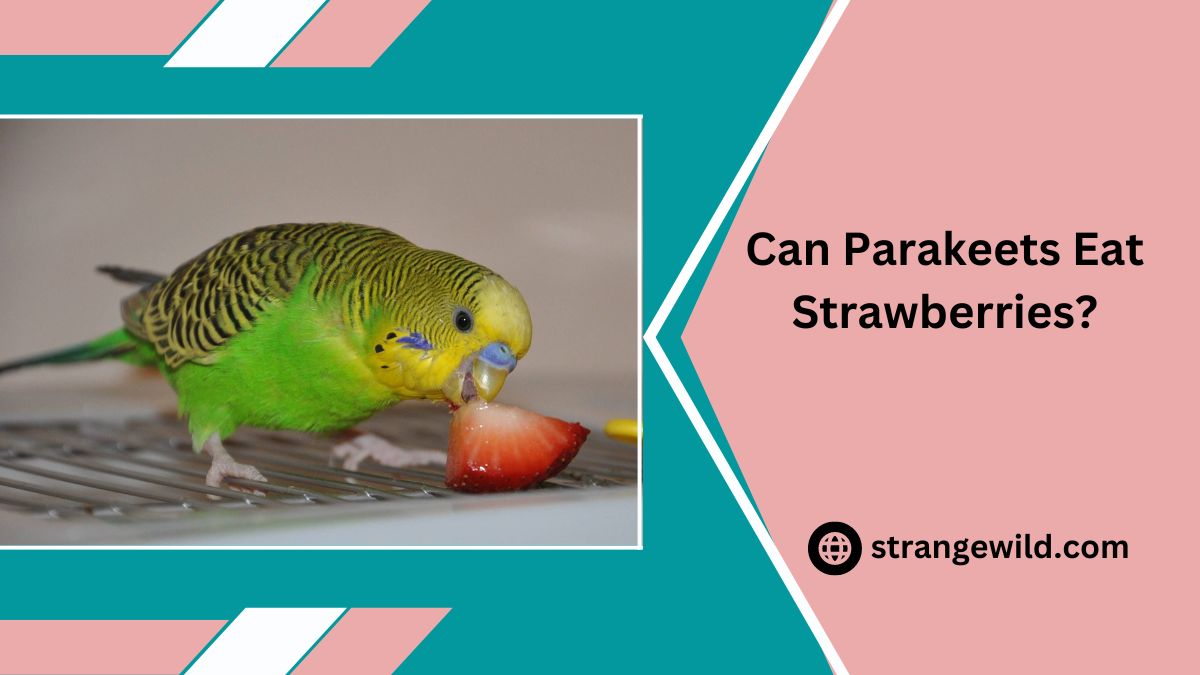Can Parakeets Eat Strawberries? Is The Fruit Healthy & Safe?
Can Parakeets Eat Strawberries?
We intend to bring a pet budgie (parakeet) home. To learn more about parakeets, I am conducting a study. I wanted to know if parakeets could eat strawberries. Instead of strawberries, a parakeet’s diet primarily consists of birdseed. Parakeets eat list
Yes, parakeets may eat fruits with seeds, such as strawberries. Larger seeds must be removed from several fruits, however tiny seeds, such as those in strawberries, are acceptable.
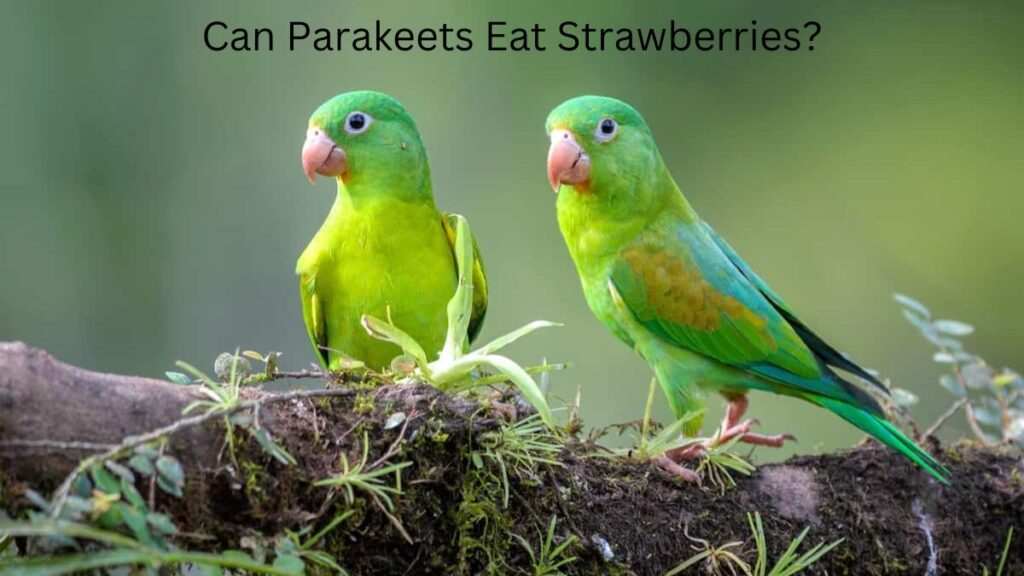
They might favor birdseed, but they also like fruit, so you can give them any berries that people would eat. All berries that are safe for human consumption, such as strawberries, blueberries, and raspberries, are edible to your companion birds. The berries you give them as snacks fall within this category. Parakeets eat fruit
As you can anticipate, this might open up a whole new universe of flavor combinations and feeding options for your pet bird. Berries are delicious and juicy treats, but they also include a wealth of vitamins and antioxidants that may help your pet develop a strong and healthy body.
What other fruits are edible to parakeets?
- Grapes
- Oranges: Parakeets particularly enjoy the seeds of citrus fruits.
- Apples: Watch out for apple seeds, as your parakeet shouldn’t consume them.
- Pears: Again, remove the seeds from the pears before giving them to your parakeet.
- Melon
- Kiwi
- Berries (this includes ANY type of berry that is safe for humans) (this includes ANY type of berry that is safe for humans)
It’s likely that parakeets prefer eating fresh fruit to receiving birdseed.
They may eat a wide range of fruits without endangering their health.
Most fruits can be eaten without risk if they are first cut open and any large seeds are taken out. The items on this list are primarily those that the parakeet enjoys the most.
You have a lot of options for what you can feed them, but these are definitely the ones where you’ll succeed the most.
What Strawberry Amount Is Recommended for My Parakeet?
Fresh strawberries should be consumed sometimes, wherever possible, as part of a nutrient-dense and well-balanced diet. Moderation is key when it comes to this sweet berry, so offer only a small amount of strawberries once a week at the most. One to two large strawberries would make a good initial serving size.
Just like with any other new fruit that is being added to the diet, you should start by giving a small amount. Keep a watch on your birds’ reactions to the meal and adjust as required. Can Parakeets Eat Strawberries?
By slicing strawberries into little bits and combining them with other fruits, you can make sure that your parakeet becomes used to a wide range of fruits. By doing this, they will get the diversity of fruits they require without developing any favorites.
How Do Parakeets Like to Eat Strawberries Best?
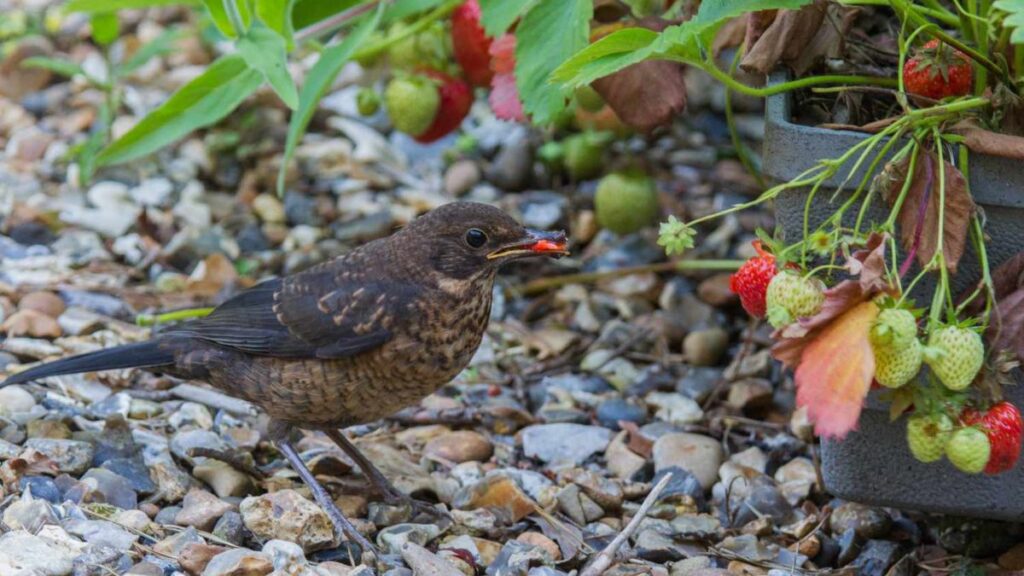
I’ve already mentioned how crucial it is to get rid of the larger seeds. Nevertheless, you can also warm up some of the fruit pieces before giving them to your parakeet. Warm weather is preferred by them, perhaps even more so than cold weather.
Fruit that has been warmed releases its juices and improves flavor, giving your pet a delightful, juicy fruit meal. Observe the following guidelines while giving fruit to your parakeet:
If you wish to feed young birds or birds who have never eaten the fruit before and are trying it for the first time, you can cut the strawberries into smaller pieces.
The best way to give them to the birds may be in this manner. Some pet owners like to mash the strawberries first, then spoon-feed their animals the mush.
Many people are unsure whether eating strawberry leaves is beneficial for humans, let alone birds. But as long as the leaves have been well washed, you can be confident that it is completely safe to do so.
In a small dish, place the fruit adjacent to the water bowl.
Warm up the fruit
Parakeets (and other birds) enjoy dipping their meal in water to make it more palatable. They’ll find it more practical if the fruit is put close to the water bowl. As soon as you can, take the old fruit out of the cage to prevent it from rotting. Your bird shouldn’t consume damaged food, of course. Your parakeet might not find strawberries to be tasty. Not every parakeet enjoys fruit.
You can give your parakeet fruit instead of birdseed if you run out. Feeding your bird fruit may be a better choice because some varieties of birdseed can be expensive.
You might not be able to get to the store for a time if you’ve run out of birdseed. If you make sure to provide them with fruits and veggies, your parakeet should be fine until you can pick some up.
Fruit is a wonderful treat, but it should be balanced with birdseed. Parakeets need a balanced diet to stay healthy and live a long life.
Some parakeets like to eat the leaves, while others avoid them. Many people like genuine fruit. It comes down to preference, but there is one thing you must test out first.
You might also periodically offer your parakeet a tiny bit of strawberry juice, but bear in mind that this is not recommended.
Freshly squeezed strawberry juice is what your bird needs because strawberry juice from a container could have extra sugars and other unhealthy ingredients.
Ensure that the addition of any fruit juice has no impact whatsoever on the water supply. Water ought to be made available first and foremost.
Tips:
Dried strawberries can occasionally even be served as a delectable dessert. Be aware that sulfides needed to preserve dried fruit, such as sulfur dioxide, are present in dried strawberries. Dried strawberries contain sulfides.
What might possibly afflict my parakeet?
The majority of fruits are good for your bird, however, there is a handful that is poisonous or will make your parakeet sick. Here is a list of foods you ought to never give your parakeet if you don’t want to put its life in danger:
Fruits with pits or seeds, such as cherries, apricots, peaches, nectarines, plums, apples, and pears, are bad for your bird.
Garlic and onions should not be given to your bird. When ingested, the sulfur compounds in onions harm the mouth lining of your parakeet. Other adverse effects include anemia and ulcers.
Allicin, a component of garlic, harms people in a way that onions do. (Hot pepper makes a fantastic stand-in.) Foods with a lot of fat are not good for your bird.
The fact that you shouldn’t give caffeine to your parakeet should go without saying, but I’m including it here just in case. Caffeine can cause a cardiac collapse in birds, so stick to water.
Despite being a vegetable, avocados are not the best thing for your bird. Avocados are used as a fat substitute by humans, and they have many of the same negative effects on birds that giving them meat would.
Your bird should avoid anything that contains artificial sweeteners, particularly Xylitol. (This is present in several sugar-free products, including juice and other similar things, and gum.)
Finally, be wary of fruits that have received pesticide treatment. Do a thorough cleaning! Your parrot could be in danger from pesticides. You are not a parakeet, despite the fact that you might not notice the consequences.
How Healthy Are Strawberries For Parakeets?
If you give your parakeet strawberries in reasonable portions and in an adequate amount, you won’t be doing any harm to the bird.
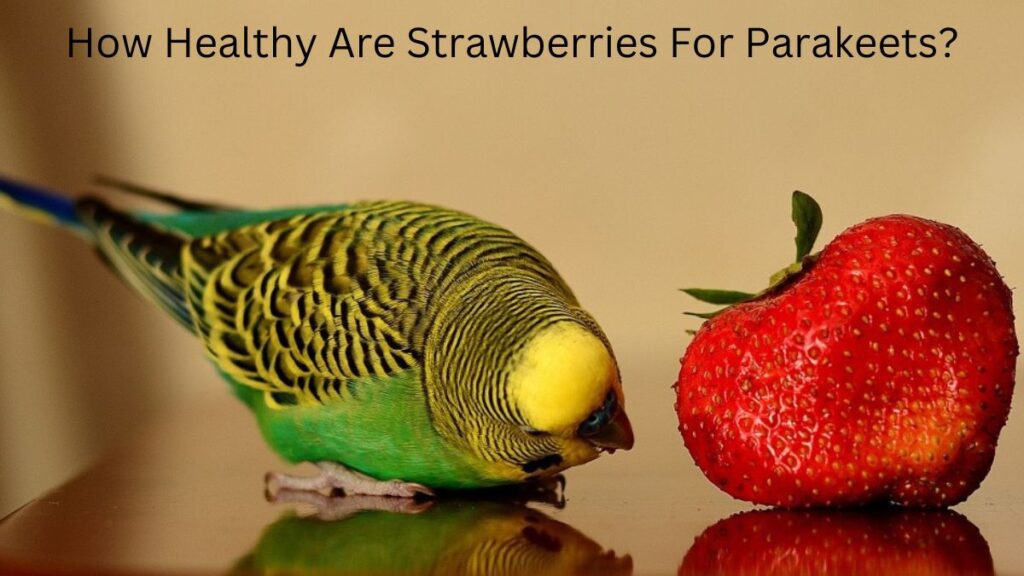
Let’s now examine this versatile berry’s complete nutritional profile in further detail:
Food Value of Strawberries
| Name | Amount |
| Energy | 5 Calories |
| Protein | 0.12 g |
| Carbohydrates | 1.3 g |
| Of which sugars | (0.88 g) |
| Fiber | 0.36 g |
| Calcium | 2.8 mg |
| Magnesium | 2.34 mg |
| Potassium | 27.5 mg |
| Selenium | 0.072 µg |
| Vitamin | C 10.6 mg |
| Vitamin A | 0.18 µg |
| Folate | 4.32 µg |
These are only a few of the many advantages that these nutrients offer for your birds’ health
High in Vitamin C: A powerful antioxidant, vitamin C supports both healthy skin and a strong immune system. Vitamin C content is high in strawberries.
Good Amounts of Folate: Must be present in appropriate amounts for both the growth of healthy tissue and the proper functioning of healthy cells.
Potassium: This meal is rich in potassium, which is essential for several biological functions, the primary among them is the regulation of blood pressure.
Manganese: Several coenzymes, which are proteins that support the body’s correct metabolism, require manganese as an important component.
High in Fiber: Fiber supports digestive health and helps prevent a wide range of diseases that could harm your bird since it offers food for the helpful bacteria that live in the stomach.
Other minerals: Strawberries also include smaller amounts of the vitamins B6, E, and K, as well as other minerals like iron, magnesium, phosphorus, and copper.
This fruit unquestionably contains a wealth of vital vitamins and minerals linked to a lower risk of a number of chronic diseases.
Strawberries primarily consist of water other than that.
Strawberries have a high water content, which helps birds stay hydrated and supports their feathers and a number of bodily processes. Furthermore, strawberries have a comparatively low GI (glycemic index) score of 40 and are low in calories.
Due to the low GI score, there won’t be any significant blood sugar spikes, which will result in more stable energy levels throughout the day.
However, despite the fact that strawberries have a wide range of nutritional advantages, as was previously said, they also contain a disproportionate amount of sugar, notably fructose (fruit sugar).
Even if the quantity of 1-2 strawberries shouldn’t be dangerous, keep in mind that if you also provide other fruits, the number can quickly add up.
Fructose should therefore not be regulated, controlled, or severely restricted in your bird’s diet. This carbohydrate can have a negative impact on a bird’s health if consumed in excess. This is one of the reasons why fruits should only make up 5% of a parakeet’s diet.
How often should I give my parakeet food?
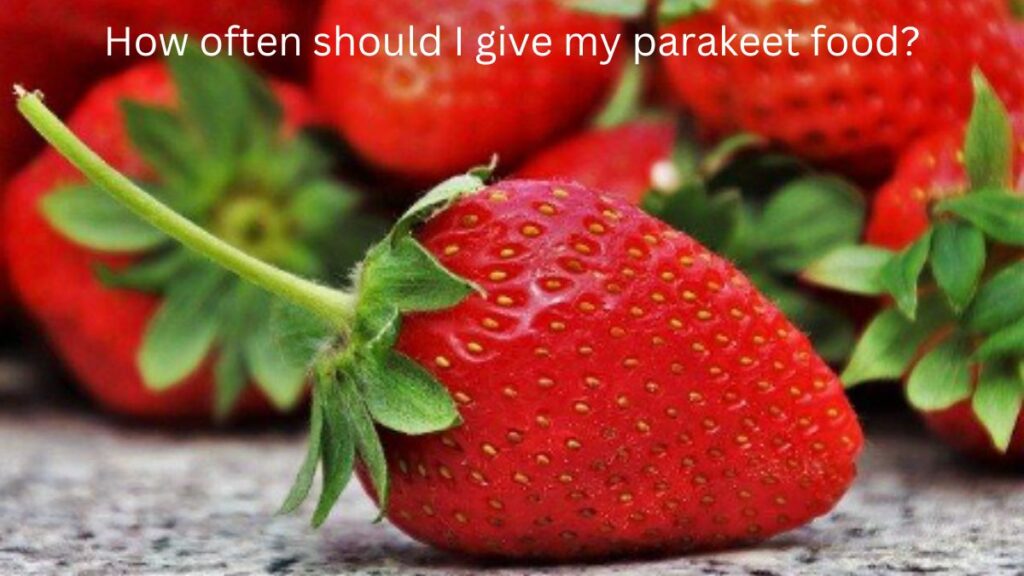
In addition to being a good source of folate (vitamin B9) and potassium, strawberries are also a good source of vitamin C and manganese.
You should give your parakeet food each day. It should be fed every day, even if you don’t have to give it all the food you have for it.
Your parakeet should at the very least receive softer foods every two days. At least once every week, you should give your parakeet eggs and foods high in protein. (If you’re curious, the answer is yes; cheese is included.)
Make sure everything you provide your parakeet is balanced and consistent. Giving him/her too much too often could make them sick.
Your parakeet has to drink water each day. Keep an eye on their water during the summer months when it’s particularly hot since paraffin can form quite easily.
You can purchase vitamins and supplements to assist your parakeet to eat a more balanced diet if you are worried that it isn’t receiving enough nutrients from its food.
You won’t have to worry about them rejecting the vitamins because you can mix some of them with their water. It is incredibly beautiful and makes everything so much easier!
How to feed parakeets strawberries
Feeding strawberries to a parakeet!
- Remove the stems.
- Wash them very well.
- Because strawberries are soft, cutting them into bite-sized pieces is not necessary, but your tiny birdie would like it if you did.
- Never feed more than one or two strawberries every other day; avoid making it a mainstay of your diet.
Wash the strawberries first
The fruit strawberry is quite sensitive. Strawberries, like other ground fruits, contain pesticides that are extremely toxic to parakeets. Giving pesticide-contaminated strawberries to birds could seriously harm their digestive systems. Consequently, it is necessary to wash off all of the dirt and chemicals that have accumulated on them.
Wash the strawberries thoroughly and soak them in a saline solution (warm water and salt) for one to two minutes before serving. Even the dirt within the apple will be removed by it.
Slice it into small pieces and reheat it
It is difficult to alter a mature bird’s eating habits. Try giving your parakeet a full strawberry first. If discomfort persists, however, break them into bite-sized pieces to make the process of ingesting easier. While some parakeets adore aromatic and delicate fruits, others are not as fond of them. Therefore, you can try warming up some fruit snacks if your parrot doesn’t appear enthusiastic about them.
As a result, the fruit will get softer and more fragrant, making parakeets absolutely unable to resist it. However, it shouldn’t be too hot, as this could damage the delicate internal organs of parakeets. With the parakeet’s pellet- or seed-based food, mix in a small amount of fruit. You can learn more about a bird’s response to a new food by observing its body language.
Serving strawberries and greens in step three
Because they are “bred to fear red,” birds occasionally become frightened by strawberries’ vivid red color. Give them the leafy strawberries, or add chopped strawberries to the fruit salad for the parakeets.
A parakeet’s diet can contain up to 30% fruits and vegetables. Make the red appear less intense however you see fit. Because parakeets enjoy drinking water after eating, put the fruit close to the water. Birds
Discard the Unconsumed Fruit
After your parakeet finishes the meal, take the dish and water pot out of the cage and clean them right away. Try to offer it the whole fruit without chopping it into parts once it begins to eat it. You will gain a better understanding of the fruit’s preferred and undesirable parts. If the bird doesn’t show any interest in the meal, only cut strawberries into bits.
Feeding parakeets by hand is one of the greatest methods for teaching them to eat. Try feeding them strawberries by hand. They will be able to get over their fear of the color red as a result, and their expressions of dread and misery will lessen. Additionally, this will improve your relationship with your pet bird.
Do Parakeets Get Sick From Eating Strawberries?
Strawberries do not pose harm to the health of your pet if your parakeet can eat them without risking choking and they have been well-cleaned. The fact that some parakeets might not love the fruit does not mean that it is bad for them.
Strawberries are among the many fruits that most birds enjoy eating and will consume as soon as possible if given the opportunity. Can Parakeets Eat Strawberries?
Strawberries have only one important drawback: it’s possible that offering them to your parakeet will cause them to have loose stools. You’ll have to clean up their mess if this happens.
Like all other fruits, strawberries should be thoroughly cleaned before eating to get rid of any dirt, debris, or pesticide residue.
Do Parakeets Face Any Risks From Strawberries?
Insofar as your bird can consume strawberries without the risk of choking and they have been well cleaned, strawberries are not at all harmful for parakeets. It’s possible that some parakeets won’t eat the berry, but that doesn’t make them dangerous.
Strawberries are especially beloved by most birds, who will devour them as soon as they are offered. The only true drawback of giving your parakeet strawberries is the possibility of loose stools, which may need you to clean up their mess.
Strawberries should always be well-washed to eliminate any dirt, debris, or pesticides, just like any other fruit. Particularly hazardous to birds, pesticides can make your parakeet ill if consumed.
Because of this, it is typically advised to buy organic strawberries when they are offered or inexpensive. It is your duty as the owner to make sure your parakeet eats a variety of foods. They ought to have access to and be encouraged to try a wide variety of fruits and vegetables. Can Parakeets Eat Strawberries?
Having said that, parakeets require a diet higher in vegetables than in fruits; between 10% and 20% of the diet should be made up of vegetables, compared to 5% for fruits.
A strawberry has a high water content, with almost 90% of its weight being water. Watery fruits can alter urine, therefore it’s important to be mindful of that. Although the color of your parakeets’ pee may change, overall, there will probably be more urine produced.
As a result of strawberries’ high water content, softer feces that mimic diarrhea were anticipated, but they didn’t materialize. The cause of the watery feces is polyuria, a benign illness.
Frequently Asked Questions

What else can I feed my pet bird, a budgie?
You can give your bird both the egg and the eggshell. Eggs are a wonderful source of protein and their shells give your bird some calcium, both of which are vital for its health. Can Parakeets Eat Strawberries?
Can parakeets eat the seeds from strawberries?
The seeds of strawberries are also edible to parakeets. In reality, a lot of parakeets like to remove the seeds from strawberries’ flesh. In addition, fibers, which have many advantages, are present in strawberry seeds. Even strawberry leaves can be fed to parakeets if they have been carefully cleaned. While some parakeets prefer to eat just the fruit piece, others adore eating them.
Watch Out for Your Parakeet’s Sugar Intake
Several vitamins, including vitamin C, which can strengthen their immune systems, are present in strawberries. Strawberries contain a lot of sugar, which may be harmful to a bird’s health. It should therefore only make up a modest amount of your birds’ diet. Budgerigar
Which parakeet food brand is the best?
Here are the top five brands of parakeet food on the market:
- The greatest natural parakeet food according to Dr. Harvey
- Diet for Super Parakeets, Volkman Avian Science
- A parakeet party is called Kaytee Fiesta.
- THE TRADITIONAL NUTRI-BERRIES OF LAFEBER FOR PARAKEETS
- Parakeets used for wild harvest on an advanced diet
Are fresh fruits from my garden okay to offer to my parakeet?
It is better to feed your parakeet fruits and veggies from your garden rather than from the supermarket. Fewer pesticides are used, and you are aware of where your food has been. Can Parakeets Eat Strawberries?
In addition, fresh produce is richer in nutrients than processed fruits and vegetables. Just be careful since homegrown food might have bacteria and fungi that can sicken your bird. It is doubtful that your bird will get sick, though.
Conclusion
Strawberries can be fed to your parakeet without risk as long as they are given in moderation and no more than once per week. Knowing that the entire strawberry is safe to eat and that there are numerous methods to present it to your bird gives you peace of mind.
Although strawberries are high in sugar, they do include a variety of vitamins and minerals that are beneficial to your bird’s health.
Because of this, fruit should only make up a minimal portion of your budgie’s diet overall. Fresh fruit, vegetables, pellets, and seeds should all be offered to your parakeet in a variety of flavors.
In actuality, a parakeet’s nutritional needs are not all that unlike those of people. Parakeets, like humans, require a well-balanced, colorful diet to make sure they are getting the proper ratio of vitamins and minerals. You should be careful not to serve strawberries in excess or too frequently due to their high sugar content.
To rule out any potential preferences, allergies, or adverse reactions, only feed modest amounts of strawberries when introducing them for the first time. Can Parakeets Eat Strawberries?
Overall, strawberries are a calorie-efficient, nutritious, and mouthwatering treat. They are a great source of a variety of vitamins, minerals, and plant-based substances. These offer significant health advantages.
Strawberry consumption lowers blood pressure, oxidative stress, inflammation, and cholesterol. The diet would benefit greatly from including these berries.
You may partake in your parakeet’s delight in the fruit, treat it like a meal you can share, and enjoy the opportunity to connect with your pet.

